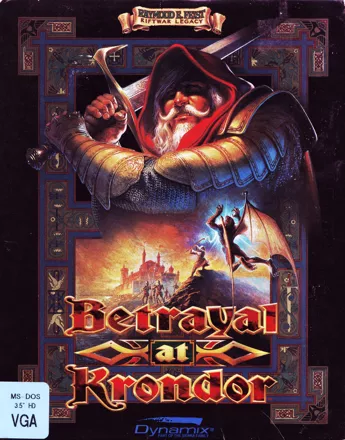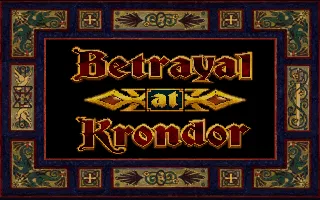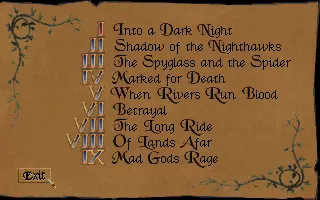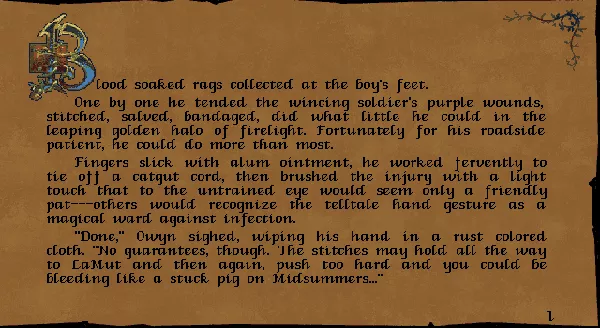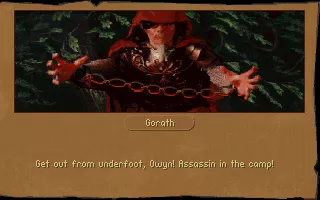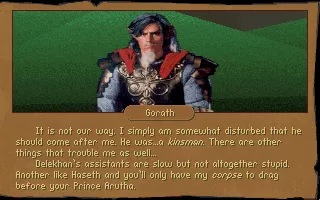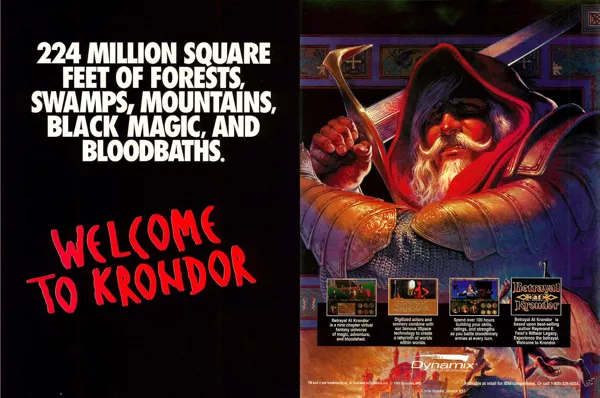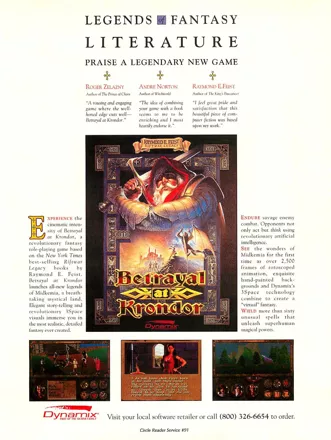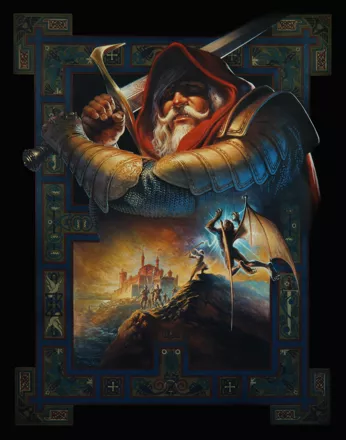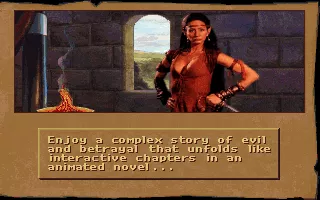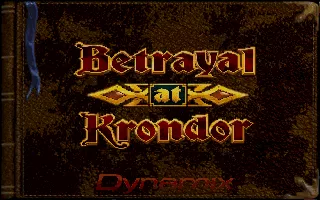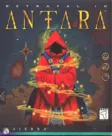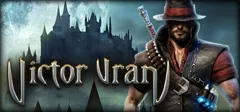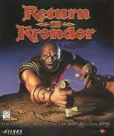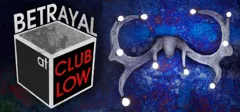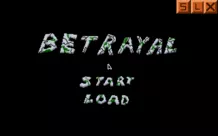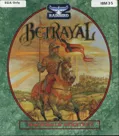Betrayal at Krondor
Description official descriptions
Based on Raymond E. Feist's Riftwar saga (and co-written by Feist himself), Betrayal at Krondor is a medieval fantasy-themed role-playing game set in the Riftwar universe.
The story begins as Gorath, a moredhel (dark elf) renegade, who intended to warn the people of Krondor of the upcoming moredhel invasion, is attacked by an assassin. Locklear, a nobleman who serves the crown of Krondor, and a young magician named Owyn decide to accompany Gorath to Krondor, where they'll have to think of a plan to stop the moredhel leader Delekhan.
The game's story is divided into nine chapters. Each chapter has a goal to achieve before moving on to the next one, but the player is given considerable freedom to explore the vast world of the game and undertake side quests. Gorath, Locklear, and Owyn are the first party of characters the player controls; however, characters may leave and others may join the party later, as dictated by the events of the story.
Exploration in Betrayal at Krondor takes place in a 3D world viewed from first-person perspective. Towns, however, are presented as a series of still screens representing locations (temple, tavern, inn, etc.). Combat takes place on separate grid-based screens. The player moves the characters on these screens in a turn-based fashion, attacking physically, defending, and casting spells.
Only two character classes are present in the game: fighters and magicians. Fighters use swords or crossbows (for long-ranged attacks); magicians can fight with staves, or cast spells. Characters have four attributes: health, strength, speed, and stamina. The latter is depleted when a character uses weapons or casts magic. The role-playing system of the game relies on skills. Each character has a set of skills, ranging from weapon proficiencies to abilities such as bartering or stealth. Skills improve after continuous usage. The player can "emphasize" a skill in order to make it improve faster.
Spellings
- קרונדור - Hebrew spelling
- 叛變克朗多 - Chinese spelling (traditional)
Groups +
Screenshots
Promos
Videos
Add Trailer or Gameplay Video +1 point
See any errors or missing info for this game?
You can submit a correction, contribute trivia, add to a game group, add a related site or alternate title.
Credits (DOS version)
153 People (109 developers, 44 thanks) · View all
| Design | |
| Lead Programming | |
| Programming | |
| Graphics / 3D Programming | |
| Level / Scenario Design | |
| Graphics / Artwork | |
| Music | |
| Art Director | |
| Cover Art | |
| Documentation | |
| Director | |
| Writing / Dialogue / Story | |
| Playtesting | |
| [ full credits ] | |
Reviews
Critics
Average score: 84% (based on 16 ratings)
Players
Average score: 3.9 out of 5 (based on 102 ratings with 12 reviews)
For players who are not graphics-oriented. Try this out.
The Good
The spell system was out of its time, most other games of that time did not have these kind of features.
The game has a great number of spells, from the passive Despair Thy Eyes to the monstrous Mad God's Rage.
The Bad
A rather buggy game,I know of a number of bugs, but some of these bugs actually made the game more fun! =)
Graphical issue again...
The Bottom Line
It has some chills in this game
(6 years ago i was playing this game and i got a little scared of the ghostly parts, now l'm still rather afraid of walking at night...)
This game has a free, full download, it is released by the kind folks from Sierra, go download it and have fun! (by search engine)
DOS · by Kevlarkid (2) · 2001
Weak in graphics and combat-engine, but overall great.
The Good
I never read the books about Krondor, but the game itself is quite immersive with background music to set the atmosphere. It isn't a game that will suck you in, but you'll find yourself really trying hard to finish the game.
There are some nice differences with this game that set it apart from most RPGs. It had some really good ideas that were very well implemented, like improvements in skills. After a fight, you might need to hammer out your armor or sharpen your sword. Your ability to do so depends on your ability level, which occasionally goes up when working on it. Sharpening your weapon takes materials (which run out), as does hammering out your armor. It's a twist that adds some reality to the game. You also consume food (which can go bad or get poisoned).
I really liked the limited magic addition. It was very well balanced, and you didn't always have to cringe about fighting a mage (like you do in the Baldur's Gate series).
Personally, I liked the simpler combat-engine, but many people complained about it. I also like the multi-character use in the game. While you can't pick your partners, you can customize them a little bit, and they add some changes to the game (rather than just decking-out one character).
The Bad
The graphics were sub-par for the era. Backgrounds were trianglulated and straight lines were extremely jagged. Quake pixel-pushing freaks will laugh.
Many people didn't like the combat-engine, either. It was limited, and some may prefer that, but it really won't appeal to power-gamers. Power-gamers also won't like running all over creation trying to better their characters and take advantage of everything. You can spend days trying to do everything beneficial for your character before really carrying-on with the game.
The Bottom Line
A great RPG with some very well implemented things that just don't show up in any other games. Magic isn't so powerful it will cause you to save and re-load every five steps, but can be a real asset to your group. Beware trying to take advantage of everything in the game or of trying to find every nook and cranny. While the game isn't huge, it is big enough and sparse enough to make you really spend time.
DOS · by Cyric (50) · 2001
A superb fantasy yarn spun in the modestly-magical world of Midkemia
The Good
Betrayal at Krondor was released in the summer of 1993, as VGA graphics were being pushed to their 2D, hand-drawn, sprite-intensive limit. This was also six months before id unleashed DOOM upon the world, beginning the push towards nearly every major game being produced in a 3D engine. As such, there is much in the way of imagination, storytelling, and overall artistry that I find most of today's big-budget, industrially-manufactured games to be lacking.
Perhaps the finest aspect of Krondor is that you can travel across the vast continent of Midkemia at almost all points in the storyline, doing as you please. Mostly, this entails traversing up and down mountainous valleys, searching out treasure caches (and attempting to open them, a joy onto itself thanks to half of them being protected by Moredhel wordlocks), battling dark elves, trolls, Brak-nur (rock-men), drakes, undead, and plenty of other sinister creatures. Then you can walk into one of the smaller towns and rest up at the local inn, play a tune for the local patrons (and get paid if you do a good enough job), sell any surplus equipment you've accumulated, have your armor repaired, and possibly take part in some other shenanigan (gambling, questing, solving mysteries, improving your combat or tradeskill abilities, and so on).
When you enter one of the major cities you are greeted with a wonderful hand-painted vista of the city and its environs, as a unique musical compositions sets the mood. This really helps create a sense of otherworldliness that allows you to sink easily into a magical fantasy mire. Great, great stuff -- just be sure you keep a window open so the odd breeze can remind you there's another world outside your house -- if you're interested in such trifling affairs.
The Bad
The graphics look dated in 2008 and were somewhat pixelated even when it was released in 1993.
When you've learned everything about the game that will give you an advantage over the armies of darkness, there isn't a whole lot of challenge inherent in the game. Combat is turn based, you can cheat in various ways (I will resist explaining here), and the storytelling is of high quality but not quite Lord of the Rings calibre.
The Bottom Line
A wonderfully deep and detailed adventure tale set in the charming medieval world of Midkemia. I'd count it among the four finest RPGs released so far, along with Ultima VII: The Black Gate, Baldur's Gate, and Final Fantasy IV.
DOS · by Chris Wright (85) · 2008
Discussion
| Subject | By | Date |
|---|---|---|
| A flood of nostalgia | St. Martyne (3648) | Mar 1, 2010 |
| CD and Floppy | Unicorn Lynx (181780) | Aug 10, 2009 |
| GameTap | SharkD (425) | Sep 10, 2008 |
| Translating BaK? | Ajan (262) | Jul 6, 2007 |
Trivia
Actors
The actors for the pseudo-video and motion capture don't look remotely like they're described by Raymond E. Feist, and some (such as Pug) are downright contradictory.
CD-ROM version
The CD-ROM enhanced version of the game includes additional goodies: * 5-minute interview with Feist * Windows-based hint system * Redbook audio soundtrack
Freeware release
Sierra has released the game for free as promotion for its two sequels. This offer only lasted for a limited time, though. The version which was obtainable through on the Sierra website was buggy and needed a patch to get it working correctly.
Novel
Raymond E. Feist, the author whose Riftwar books Betrayal at Krondor is based on, has actually written a book based on the game entitled Krondor: The Betrayal, the first part of a new series called The Riftwar Legacy. The book has the same basic plot as the game, but of course has been altered somewhat to fit the format as well as to be more consistent with Feist's Midkemia series as a whole.
Feist does display an interesting knowledge of the game, however. For example, the method by which the villain is ultimately defeated in the book is actually a valid tactic for winning the final battle.
Sales
When the Betrayal at Krondor first came out it did so miserably at sales that Sierra canceled all plans for a sequel. Later, Sierra rereleased the game on CD-Rom and the game suddenly became a huge hit. By that time, however, Raymond E. Feist already had a contract with a different publisher.
Awards
- Computer Gaming World
- June 1994 (Issue #119) – Role-Playing Game of the Year
- February 1996 (Issue #139) – Introduced into the Hall of Fame
- November 1996 (155h anniversary issue) - #43 in the “150 Best Games of All Time” list
- GameStar (Germany)
- Issue 12/1999 - #76 in the "100 Most Important PC Games of the Nineties" ranking
- PC Gamer
- November 1999 - #44 Best Game of All Time
Information also contributed by Alan Chan, Adam Baratz Kalirion, PCGamer77, William Shawn McDonie and WizardX
Analytics
Upgrade to MobyPro to view research rankings!
Related Sites +
-
Alt-Tab: Betrayal at Krondor
Site dedicated to the game, includes various reviews of the game and some downloads. -
Betrayal At Krondor Help Web
All Things BAK. Also has a link to Sierra where you can download the game for free. -
Betrayal at Krondor - FAQs & Guides
Various Guides and FAQs posted on GameFaqs.com -
Mike's Betrayal at Krondor pages
Great resource site for Betrayal at Krondor. -
Official product page of Windows version distributor GOG
Official product page for the Windows version of Betrayal at Krondor - distributed by GOG.com.
Identifiers +
Contribute
Are you familiar with this game? Help document and preserve this entry in video game history! If your contribution is approved, you will earn points and be credited as a contributor.
Contributors to this Entry
Game added by Trixter.
Windows added by Picard.
Additional contributors: Jeanne, Tony Austin, formercontrib, Crawly, Paulus18950, Patrick Bregger.
Game added September 21, 1999. Last modified January 20, 2024.
